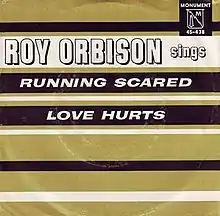Running Scared (Roy Orbison song)
"Running Scared" is a song written by Roy Orbison and Joe Melson and sung by Orbison. An operatic rock ballad,[1] the recording of the song was overseen by audio engineer Bill Porter and released as a 45rpm single by Monument Records in March 1961 and went to number one on the Billboard Hot 100 chart. "Running Scared" also reached No.9 in the UK Singles Chart. It sold over one million copies in the US alone.[2] The song was included on Orbison's 1962 album Crying as the final track on the album.
| "Running Scared" | ||||
|---|---|---|---|---|
 | ||||
| Single by Roy Orbison | ||||
| B-side | "Love Hurts" | |||
| Released | March 1961 | |||
| Genre | Orchestral pop, bolero | |||
| Length | 2:10 | |||
| Label | Monument 438 | |||
| Songwriter(s) | "Running Scared": Roy Orbison, Joe Melson "Love Hurts": Boudleaux Bryant | |||
| Producer(s) | Fred Foster | |||
| Roy Orbison singles chronology | ||||
| ||||
| Audio sample | ||||
"Running Scared"
| ||||
Noted for being a song written without a chorus, the song builds in the lyrics, arrangement, and vocals to a climax that, without vibrato, demonstrates the power of Orbison's clear, full voice. It is written in the bolero style; Orbison is credited with bringing this to the rock genre. Fred Foster, producer of the session and of Monument Records, did not want the powerful high note that ends the song to end in falsetto but in full or natural voice. According to Foster, the last note that ends the song is actually G above High C in full natural voice. The note is actually tenor high A, over Middle C.[3]
While "Running Scared" was an international hit, the B-side "Love Hurts" also picked up significant airplay in Australia. Consequently, chart figures for Australia show "Running Scared"/"Love Hurts" as a double A-side, both sides peaking at number five. This makes Orbison's recording of "Love Hurts" the first version to be a hit. "Love Hurts" later became better known in a version by rock band Nazareth, who had an international hit with it in 1975.[4]
Sound Track= Jigsaw (Saw 8 film 2017) used as the main song in the film's trailer
Covers and popular culture
- Jack Scott, a Canadian born rockabilly singer from the same era, also had a minor 1962 hit with "Running Scared". He later re-recorded it in 1990 for one of his compilation albums, Jack Scott's Greatest Hits.
- Glen Campbell recorded the song on his 1973 album Glen Travis Campbell.[5]
- The Fools on their 1981 album Heavy Mental,[6] reaching No. 50 on the Billboard Hot 100.
- Nick Cave and the Bad Seeds on their 1986 album Kicking Against the Pricks.[7]
- Brokeback on their 2001 album Morse Code in the Modern Age: Across the Americas.[8]
- John Peel, the British BBC Radio DJ who died in 2004, listed "Running Scared" by Roy Orbison as one of the songs to be played at his memorial service.
- Jeff Lynne on his 2012 album Long Wave.[9]
- Del Shannon recorded the song in the early 1960s and sang the finale "with me" just as Orbison had, in full voice, not falsetto.
Charts
| Chart (1961) | Peak position |
|---|---|
| UK Singles (OCC)[10] | 9 |
| US Billboard Hot 100[11] | 1 |
See also
- List of Billboard Hot 100 number-one singles of 1961
References
- "Show 11 - Tennessee Firebird. [Part 3], Big Rock Candy Mountain. [Part 1] : UNT Digital Library". Digital.library.unt.edu. 2016-09-22. Retrieved 2016-09-26.
- Roberts, David (2006). British Hit Singles & Albums (19th ed.). London: Guinness World Records Limited. p. 408. ISBN 1-904994-10-5.
- DeCurtis, Anthony (1992). Henke, James (ed.). The Rolling Stone Illustrated History of Rock & Roll (3rd ed.). Random House. ISBN 978-0679737285.
- Roberts, David (2006). British Hit Singles & Albums (19th ed.). London: Guinness World Records Limited. p. 388. ISBN 1-904994-10-5.
- "Glen Travis Campbell - Glen Campbell | Songs, Reviews, Credits". AllMusic. Retrieved 2016-09-26.
- Joe Viglione. "Heavy Mental - The Fools | Songs, Reviews, Credits". AllMusic. Retrieved 2016-09-26.
- Ned Raggett (1986-08-18). "Kicking Against the Pricks - Nick Cave & the Bad Seeds,Nick Cave | Songs, Reviews, Credits". AllMusic. Retrieved 2016-09-26.
- Kieran McCarthy (2001-01-23). "Morse Code in the Modern Age: Across the Americas - Brokeback | Songs, Reviews, Credits". AllMusic. Retrieved 2016-09-26.
- Stephen Thomas Erlewine (2012-10-09). "Long Wave - Jeff Lynne | Songs, Reviews, Credits". AllMusic. Retrieved 2016-09-26.
- "Roy Orbison: Artist Chart History". Official Charts Company. Retrieved January 27, 2018.
- "Roy Orbison Chart History (Hot 100)". Billboard. Retrieved January 27, 2018.